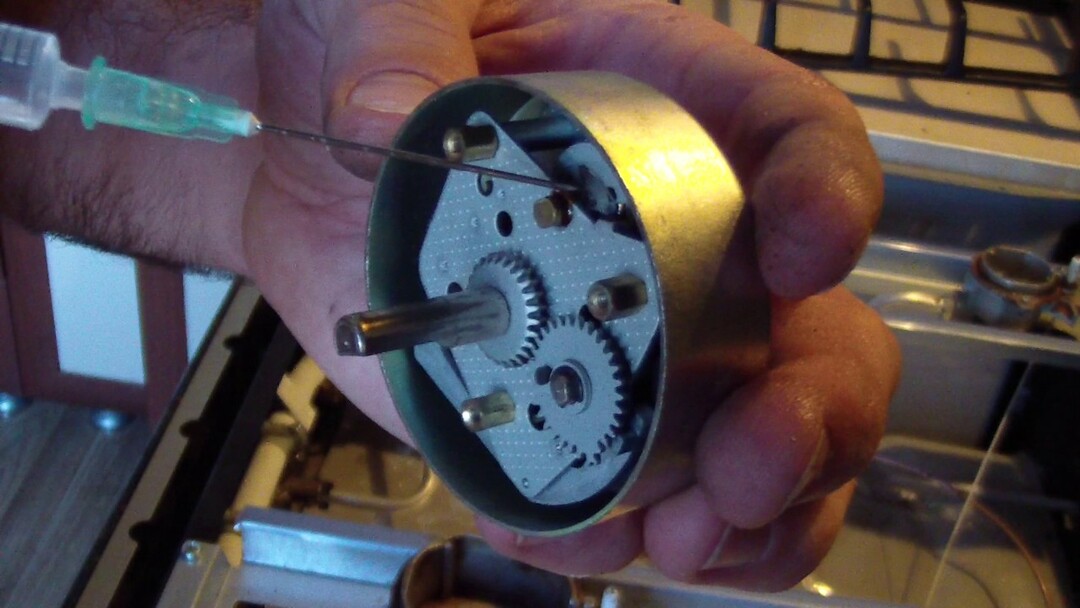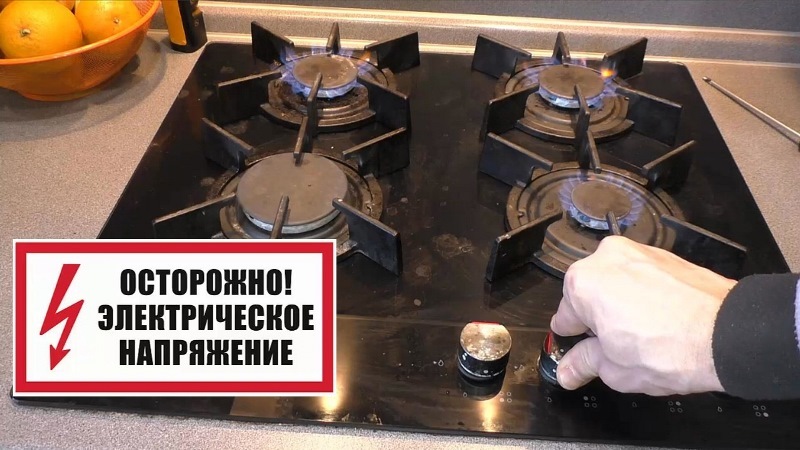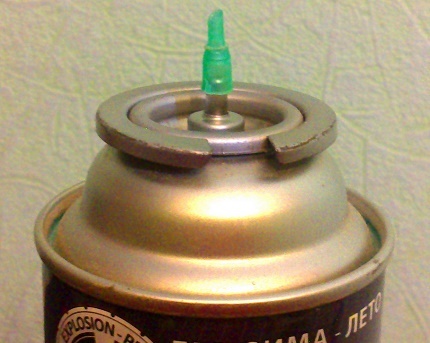To less wash the gas stove in the kitchen, some people try to cook carefully and cover the hob with foil or special fiberglass pads. Agree that these methods are ineffective, because the grate remains unprotected and grease and carbon deposits still accumulate on it.
You can get rid of contamination with commercial detergents, but not all of them are safe for health and the environment. We will tell you how to clean the grate of a gas stove without expensive chemicals. In this article, we will look at the most effective home remedies to help deal with various types of contamination. We will select the best ways to deal with carbon deposits and grease on stainless, cast-iron and enameled gratings.
The content of the article:
- Preparation for general cleaning of the grate
-
Cleaning methods for cast iron grates
- Method # 1 - burning with fire
- Method # 2 - cleaning with laundry soap
- Method # 3 - washing the grate with 9% vinegar
-
Cleaning the enamel grilles
- No. 1 - a mixture of dry mustard and vinegar
- # 2 - vinegar and water
- No. 3 - melamine sponge
- Grease removal from steel grates
- Tips for maintaining the grill
- Conclusions and useful video on the topic
Preparation for general cleaning of the grate
The grate should be cleaned separately from the gas stove. The structure must be carefully detached from the hob. If there are rubber or plastic stands, they must be removed as well. Sectional lattice products are convenient dishwasher safe or in a prepared bowl with a special detergent.
On some stove models, the grill cannot be removed; in such a situation, it is more difficult to wash the fat. Cleaning will have to be done on the stove. To remove dirt in hard-to-reach places, use additional small brushes.
It is only necessary to wash the gas stove with durable rubber gloves. They will protect the skin of your hands from the negative effects of detergents, protect your fingers from sharp protrusions on the grate and prevent them from smearing with soot.
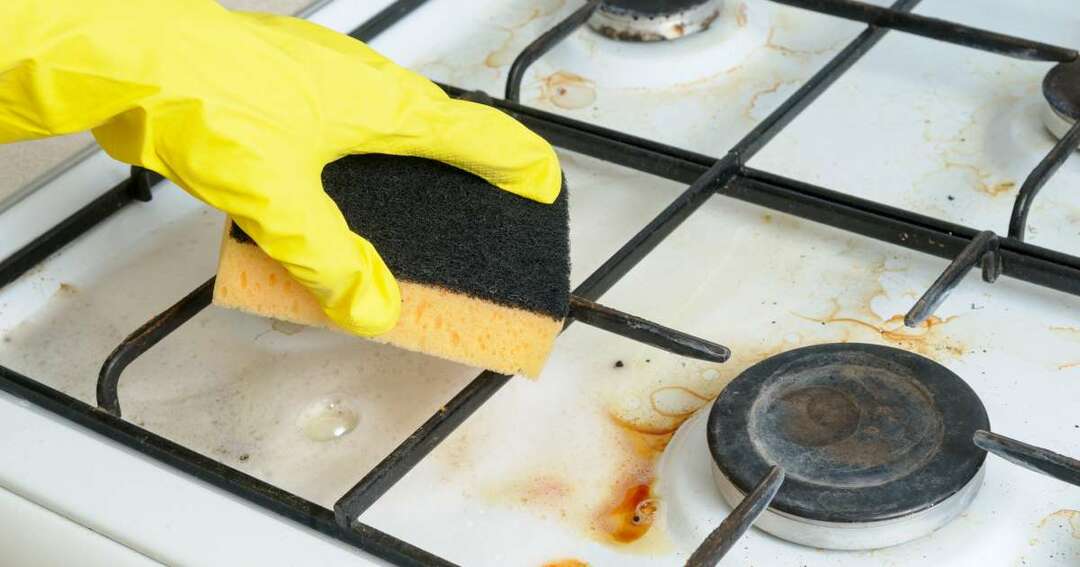
For cleaning the grill of the stove, it is better to buy gloves with a grooved surface. They do not slip, so wet parts will not fall out of your hands. Small dirt can be wiped off with a rough surface
Before you clean the grate of your gas stove with purchased powders or improvised means in at home, you need to see what material the structure is made of (cast iron, enamel or steel). Since some powerful agents can "eat away" not only carbon deposits, but also the top layer of the coating.
Cleaning methods for cast iron grates
Many people buy gas stoves with cast iron grates. They are strong, not able to deform from high temperatures and are durable.
Despite its massive appearance, cast iron is still a finicky metal and should be cleaned carefully.
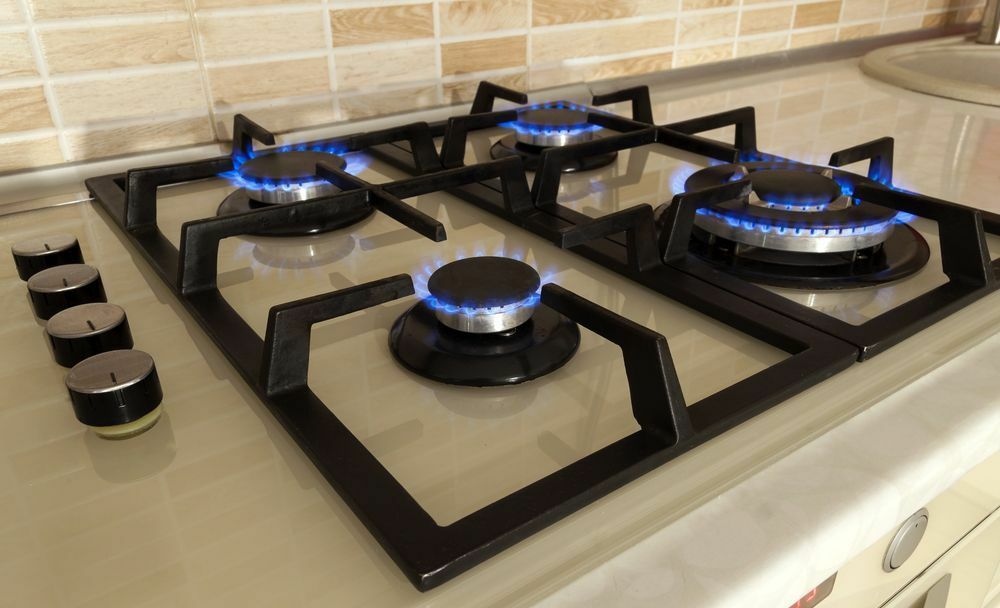
The cast iron grates are not dishwasher safe. From prolonged contact with water, the metal can be damaged and rusty.
It is impossible to scrape off the fat with a knife from the cast-iron grate, since metal particles can be scraped off together with the dirt. The use of metal brushes is also not recommended.
The material also reacts poorly to strong abrasive substances. Next, let's take a look at the best and safest cleaning methods.
Method # 1 - burning with fire
This is the best method for cleaning cast iron grates, it will get rid of the grease layer even in hard-to-reach places. The grate can be ignited directly above the gas burners or used for these purposes. gas burner.
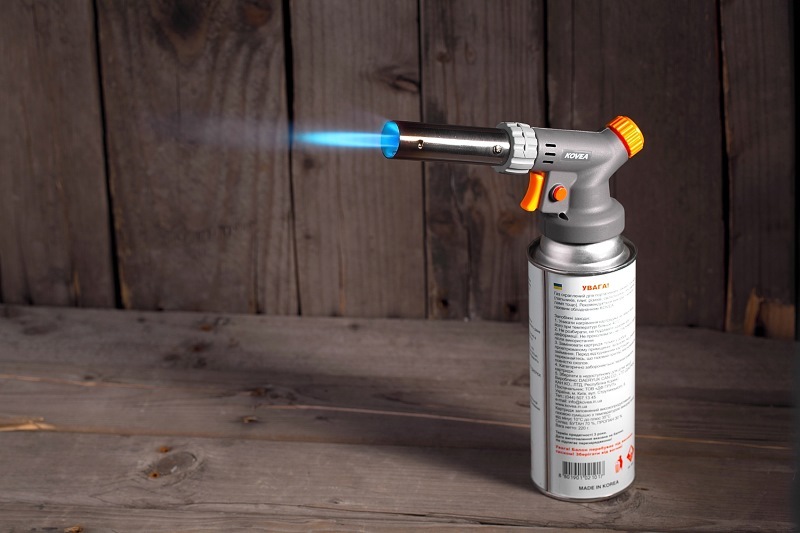
It is best to ignite a cast iron grate outdoors. You can light a fire or use a gas burner. Fat gives off an unpleasant odor when it burns. If the procedure is to be performed indoors, be sure to open the windows and turn on the hood. By the way, a cooker hood is also needed from time to time. clean off fat.
Algorithm of actions:
- Place the wire rack over a lighted hotplate or open fire.
- Turn over the cast-iron structure periodically, it should warm up from all sides.
- Wait until the fat is completely burned out.
- Allow the rods to cool.
- Wipe off soot and dirt residues with a damp cloth. Dry the product immediately.
Calcination can also be carried out in sand. To do this, the grid is placed on a sheet of metal or a baking sheet. Cover with sand and put the container on the fire. Contamination from the structure should burn out in a couple of hours.
Method # 2 - cleaning with laundry soap
For this procedure, you will need a piece of 72% laundry soap and 100-150 grams of stationery glue. Water is poured into a container of a suitable size and heated to almost boiling. Then add the grated soap and glue, mix everything thoroughly. The grill is lowered into the finished substance and "boiled" for about two hours.
The fat will melt from the high temperature; after the procedure, it must be washed off from the hot metal structure. If the dirt has come off partially, then the residue can be wiped off with the hard side of the dishwashing sponge. Be sure to immediately dry the grate, you cannot leave it wet.
Method # 3 - washing the grate with 9% vinegar
3 tablespoons of 9% vinegar are added to a container with water. The grill of the plate is soaked in the solution and placed in an oven preheated to 60-80 degrees.
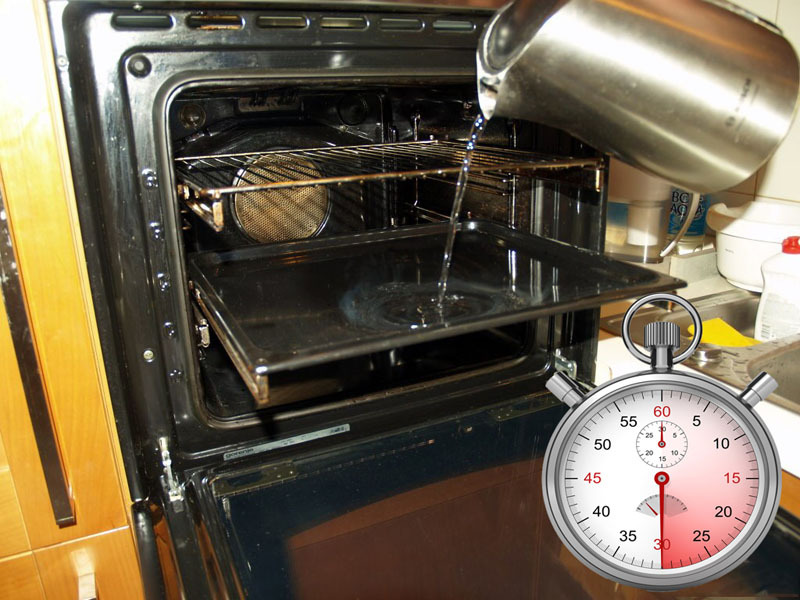
Some people use regular dish detergent instead of vinegar. The effect is no worse - the layer of fat is steamed and easily leaves
The steaming procedure will take at least 30-40 minutes. Afterwards, grease can be wiped off with a sponge. Once again, it is better not to wet the cast iron rods. This method is best suited for oversized gas stoves where the grate is not too large or sectional.
Cleaning the enamel grilles
Such grilles look more attractive than their cast iron counterparts. They are lightweight, water resistant and have a smooth, shiny surface.
The enamelled coating is not highly resistant to mechanical damage. To protect the structure from scratches, it is better not to use aggressive detergents for cleaning. The product can be washed in a dishwasher if the dimensions allow.
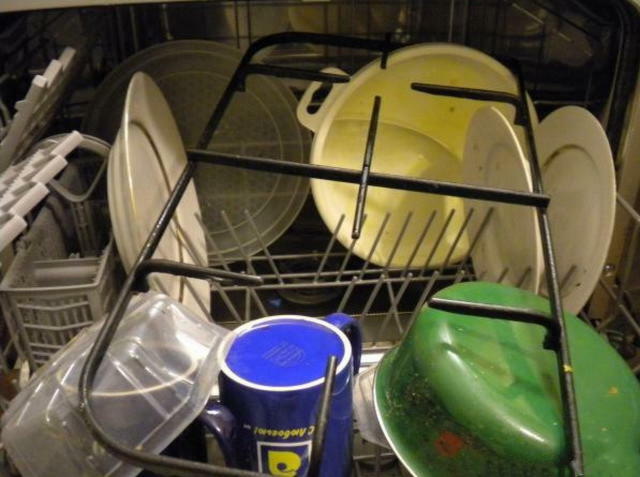
To wash off carbon deposits from the enamel grate in the dishwasher, you need to use the longest washing cycle with the highest possible temperature. More detergent is added than usual
Not everyone has a dishwasher, so we will figure out how to clean the enamel grate of a gas stove from grease and carbon deposits with improvised means.
No. 1 - a mixture of dry mustard and vinegar
Mustard has disinfecting properties and is capable of breaking down fat. It is completely safe for health, so it can be used as a home cleaning agent.
Steps in the grate cleaning procedure:
- The ingredients are mixed: 3 tablespoons of 9% vinegar, 3 tablespoons of mustard powder, 1 spoon of dishwashing detergent.
- With the help of hot water, the substance is brought to a mushy state.
- Apply the resulting product to the bars of the lattice.
- Leave for 2-3 hours, depending on the degree of contamination of the product.
- Rub the structure with a washcloth and wash off the dirt.
Cleaning the grate in this way does not require large investments and is quite easy.
# 2 - vinegar and water
Vinegar is highly greasy and is often the main ingredient in many cleaning products. To clean the grate of the gas stove from carbon deposits, it is soaked in vinegar and water (1: 1) and left overnight. Until the morning, the dirt will dissolve, you just need to rinse and dry the enamel structure.
No. 3 - melamine sponge
Mustard and vinegar do well with carbon deposits, but both require a minimum of 3 hours to complete.
And if the guests are "on the doorstep" and need to get rid of fat urgently, how can you quickly clean the grate of the gas stove? In such a situation, a melamine sponge will help.
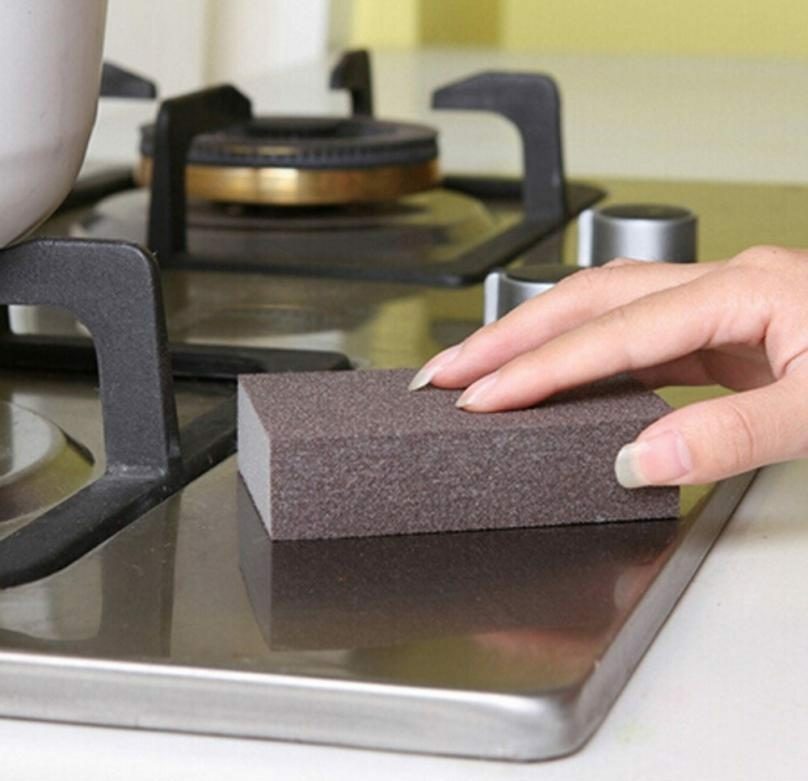
Melamine sponge is on sale recently. The product is expensive. But it is still a popular tool, because it allows you to effectively and quickly get rid of various surface contaminants.
It is very simple to use a sponge: moisten with water, wipe the bars of the grates and rinse with clean water. With the help of the product, you can get rid of carbon deposits not only from enameled surfaces, but also from cast iron and even steel structures.
Grease removal from steel grates
Steel products are the most unpretentious of all grating options. Therefore, you can clean them using any of the above methods. We also picked up a few more tools that can effectively remove grease from a steel grate on a gas stove.
If the fat layer is impressive, then ammonia is used. One can of the product is poured into a bag with a wire rack and screwed tightly.
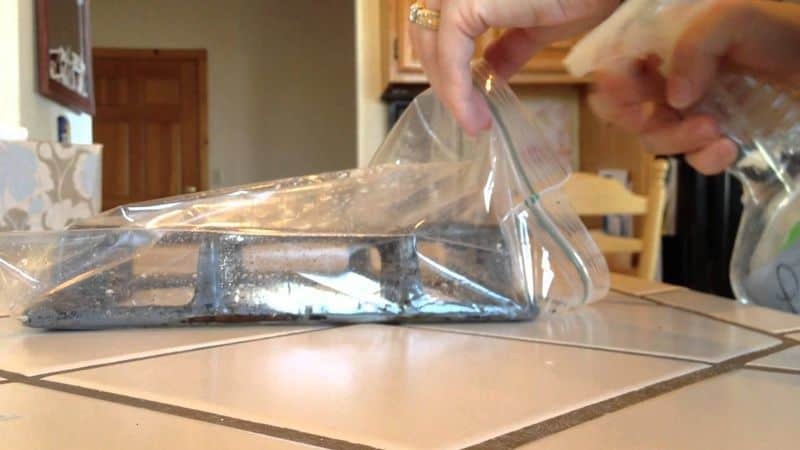
To clean the grate with ammonia, it is convenient to use bags with a Zeep fastener. You can evenly distribute ammonia over a metal product using a spray bottle
It is better to take the package to the balcony or street. It is ideal to wait 5-6 hours and then rinse the wire rack with water. Grease and carbon deposits can be easily removed. Be sure to carry out the procedure with gloves, because you can damage the skin of the hands.
In addition, steel grates can be easily cleaned with abrasive products, rubbed with metal brushes and scraped with a knife. Some people rub the structure with sand until all the fat is peeled off, and then they simply rinse with water.
Tips for maintaining the grill
In addition to Maintenance the gas stove needs maintenance. In order not to wash the grate for hours, you need to constantly keep the stove and its components clean.
Grease splashes are easier to scrub off when fresh, so always wipe down the stove after cooking.
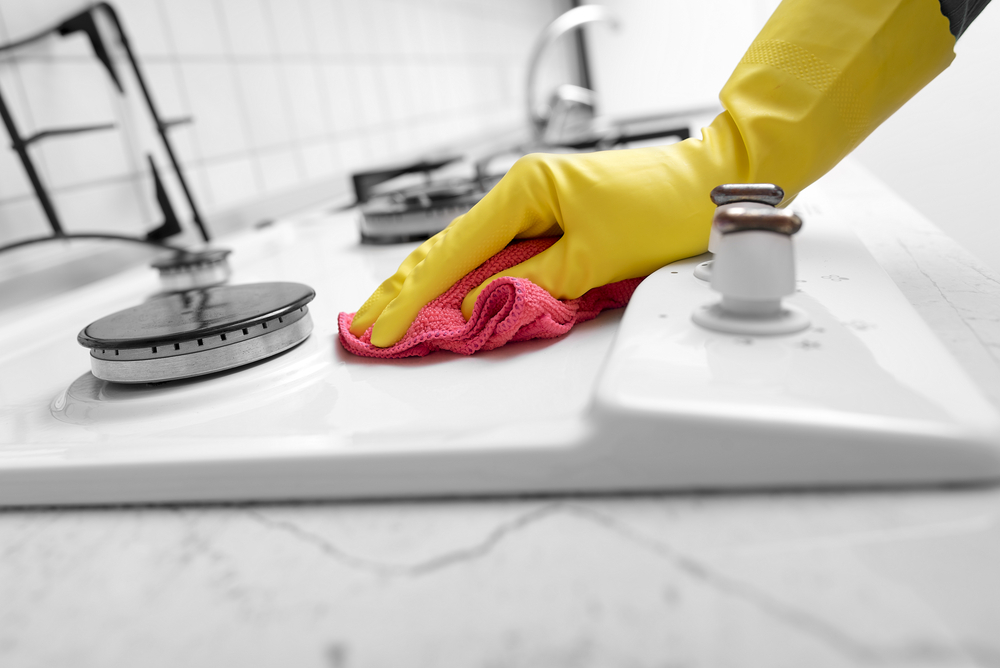
If you arrange a "cleaning day" for the gas stove at least once a week, then you will spend much less time on the fight against fat and carbon deposits in the future.
Care instructions:
- Fresh grease stains can be easily removed with lemon. The contaminated surface of the grate is simply rubbed with a lemon wedge and after 30 minutes wiped with a regular sponge.
- The grill should not be left wet - grease and dust adhere faster to damp surfaces.
- If the grill smells unpleasant, sprinkle it with vinegar and sprinkle with salt on it. After 15 minutes, rinse everything and wipe dry.
- After removing stains, streaks may remain on the metal structure. You can get rid of them with a steam cleaner, it will destroy the remaining fat in hard-to-reach places and eliminate smudges.
To avoid contamination of the gas stove as a whole, some housewives recommend covering the surface with foil before starting cooking. After the end of cooking, the foil is removed. Then there are no grease splashes on the hob.
Also, during preventive cleaning, do not forget about cleaning the stove handles. For which you can use gruel made from soda and water. It is convenient to apply it with a toothbrush, treating not only the handles, but the dirty areas nearby. The composition is suitable for cleaning removable and non-removable handles.
Conclusions and useful video on the topic
The video below will allow you to compare and evaluate the effectiveness of the most popular home methods for cleaning gas stove grates:
There are many options for easy cleaning of gas stove grates from grease. Mustard powder, baking soda, and other homemade "cleaners" cost pennies. However, they cope with carbon deposits and various contaminants no worse than expensive purchased gels. The main thing is to choose the right cleaning method for cast iron and enamel structures and don’t forget to wear gloves. Steel grilles are unpretentious in the care, they can be washed in any way listed in the article.
What tools do you use to clean the grate? Or do you think it's easier to buy a bottle of cleaning "chemistry" than to experiment and tinker with calcining and preparing various home remedies? Express your opinion, take part in the discussion, ask questions you are interested in on the topic of the article - the comment form is located below.
